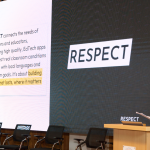September 29, 2021
Digital Education in Africa: Ifeyinwa Maureen Okafor is a Chartered Accountant and Chartered Secretary and Administrator who is on the Advisory Board of EmBED, an EdTech startup that aims to make education affordable and accessible for every African child. She is an Amujae Leader of the Ellen Johnson Sirleaf Presidential Center for Women and Development’s Amujae Initiative.

The importance of a digital education
According to UNESCO, 97.5 million children in sub-Saharan Africa between the ages of six and 17 are out of school—more than anywhere else on the planet. Overall, sub-Saharan Africa’s total out-of-school rate is 31%, nearly double the global rate of 17%.
This is a huge problem in its own right, and it’s further exacerbated by continued poverty, internal displacement, and socioeconomic inequalities, especially in rural areas. How can Africa hope to build a bright future for all its citizens if we don’t provide a digital education and teach our children the skills they need to succeed in life? The answer, of course, is that we can’t.
We have less than a decade left to achieve the 2030 target for Sustainable Development Goal (SDG) #4—education for all—and our continent is once again behind in its efforts.
But there’s reason to be optimistic: we now have the technology to bring high-quality education to every child in every village no matter where they are or the income of their parents. The only question is: do our leaders have the political courage to do it?
It’s past time to embrace digital options
As we’ve seen throughout the COVID-19 pandemic, digital learning tools and digital education can be a gamechanger for education access.
Education technology (EdTech) is not a replacement for traditional in-class tutoring, but a complement. It will be a hard fight to get every African child in school, and one that we should put all our efforts behind, but realistically it will also be a long fight. The advantage of EdTech is that we can quickly give millions of children access to education while we continue the fight for adequate investments into education across our continent. I can’t think of a single reason not to do so.
By combining innovative learning techniques with digital technology, EdTech has the potential to offer cost-efficient access to educational tools and resources. If we dare to invest, EdTech has the potential to increase literacy and numeracy skills, close disparities in education access, and help Africa take significant steps towards achieving major development goals.
It will also help students develop key digital skills that are increasingly important for their future success—across all sectors, not just tech. Indeed, the World Bank’s ‘Future of Work in Africa 2020’ report found that sub-Saharan Africa’s digital skills lagged well behind those of other regions. Our children must be introduced to these new ways of learning so they can compete and thrive in the global market.
EdTech can be as simple as a gamified approach to learning that could help children aged between two and five years of age develop literacy, numeracy, and thinking skills. It can also provide access to a full nine-year curriculum to cover science, technology, arts, agriculture, engineering, and mathematics (STEAAM).
RECOMMENDED: https://global-edtech.com/category/edtech-market/
Embedding a full curriculum into an app or platform can help young learners see their education as a journey and an adventure. The gamified approach improves motivation and engagement, allowing them to compete with friends, and can provide students with immediate feedback. EdTech can make educational experiences more tailored – and even addictive.
EdTech also has the capability to standardize education between cities and even countries. One of the major challenges that must be resolved as the continent embraces the African Continental Free Trade Area (AfCFTA), is that countries will need to be able to recognize education certificates and standards to streamline visa processes. If governments are serious about education, EdTech is an important piece of the puzzle.
Governments are missing the time to act
According to the African Development Bank, a further $40 billion USD in additional investments will be needed per year until 2030 to achieve SDG 4 in Africa. Currently, only six of the 49 countries in sub-Saharan Africa are on track to meet this SDG goal. If we don’t do something urgently to change these hard facts, our aspirations for our children and our continent will remain mere wishful thinking.
Unfortunately, elected officials across sub-Saharan Africa still fail to realize that our continent’s greatest resource is not mineral wealth or natural resources—it is our people. We have millions of young people with dreams and aspirations for their own bright future. They deserve to see those dreams come to fruition—and in the process become unquestionable assets for Africa’s future competitiveness.
To make this a reality, leaders should explore opportunities to embed digital tools in existing curricula, ensure that digital infrastructure is in place to enable universal access to EdTech tools, and develop a comprehensive quality assurance framework.
EdTech is no panacea to the challenges Africa must overcome. But if we can make that journey a little shorter and a little easier through EdTech and other innovative tools, what reason do we have not to do so? I’d say no reason at all—and I call on leaders across Africa to make education their top priority. Not for any individual’s sake, but for the sake of our continent and, most importantly, for the next generation.
New to EdTech? Read our EdTech 101 guide: https://global-edtech.com/edtech-definitions-products-and-trends/








